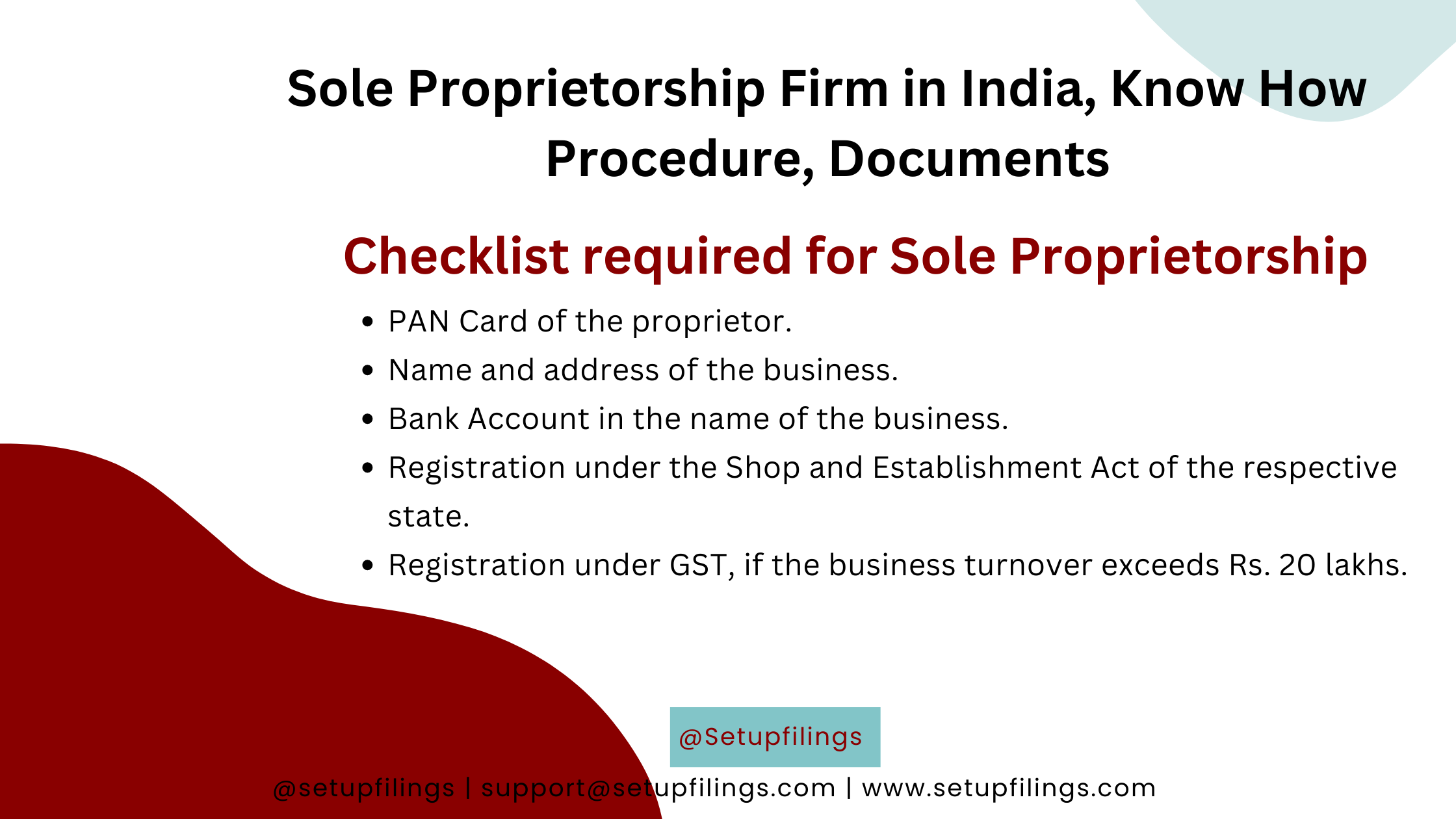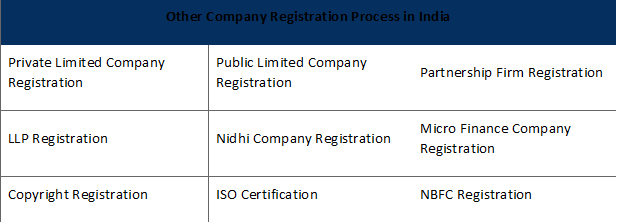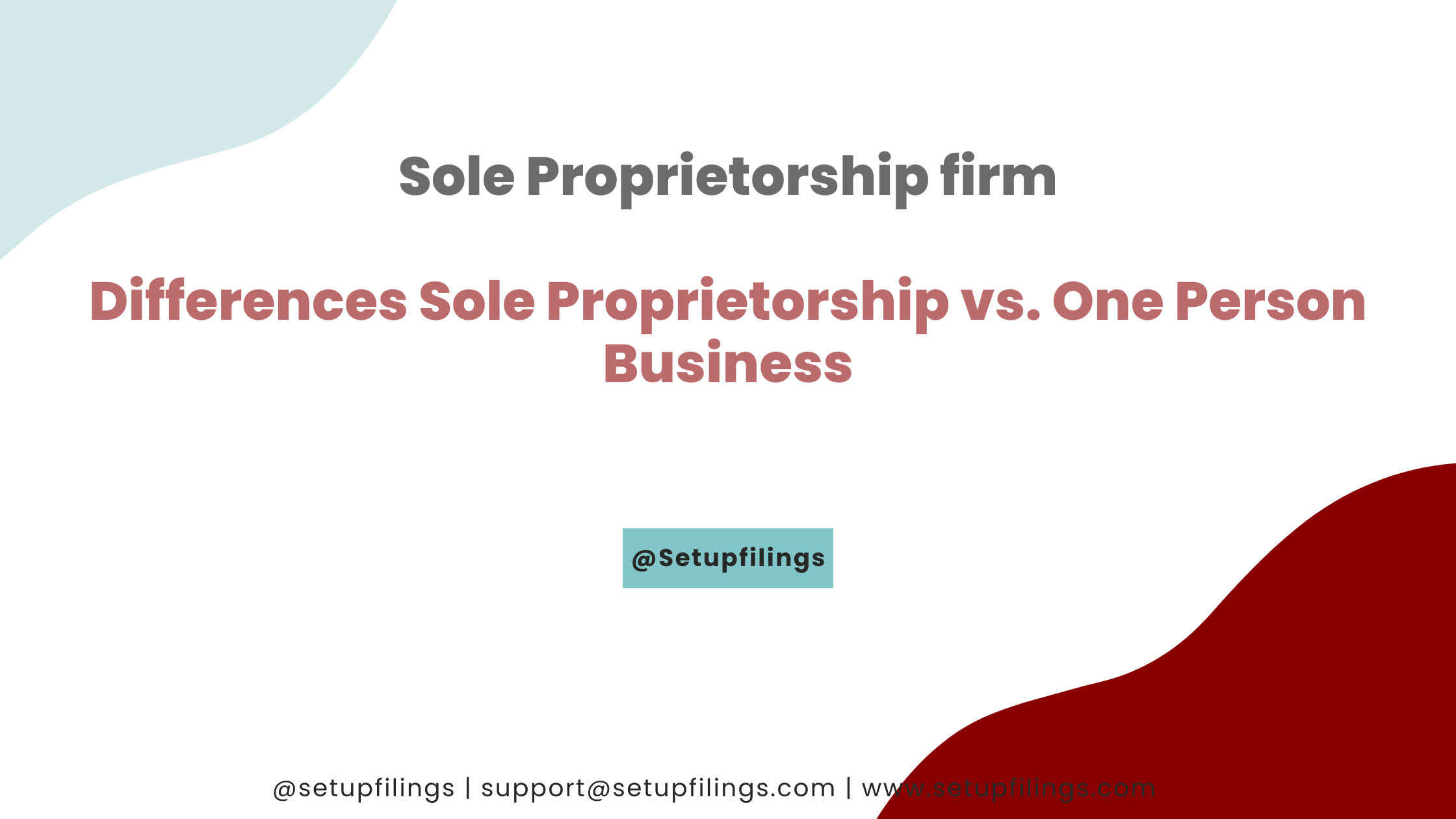
Sole Proprietorship Firm in India, Know How | Procedure, Documents
In India, a sole proprietorship is a single-person enterprise or one-person corporation in which an individual owns, manages, controls, implements, and executes his or her own business. Since it is not heavily regulated by law, it is the most convenient way to do business in India. It is not required to register as a sole proprietorship, although many individuals do so in order to get tax advantages. The profits and losses of a company or business are shared by just one individual who owns the firm or business.
Individuals who hold enterprises as sole owners are referred to as sole proprietorship firms. A sole proprietorship is a business in which there is no separation between the individual and the company entity. A solo proprietor is sometimes referred to as a sole trader, an individual entrepreneur, and other terms. As a result, there are certain advantages to running a sole proprietorship business.
The Registration of a Proprietorship Firm
A sole proprietorship business does not need any special registration, although the owner is urged to get certain necessary registrations for the firm’s operational running. The following registrations are necessary for a sole proprietorship firm:
1. Registration of MSME
It is not required to get an MSME (Small and Medium Business) registration, but it increases the business’s prospects of obtaining financing and aids in other legal concerns. The MSME registration procedure may be completed online at the MSME official website. This is a basic procedure that makes life easier for single owners.
2. License under the Shop and Establishment Act
While a Shop and Establishment Act license is not required for all single proprietorship businesses, most must get one in accordance with the local rules of the business’s location. The municipal party issues the Shop and Establishment License. This license is granted depending on the number of workers in a business. The registration procedure varies by state, and company owners must consult the appropriate state website for registration.
3. Registration for the Goods and Services Tax (GST).
Registration for the Goods and Services Tax is required only if the yearly sales exceeds Rs 40 lakh, or Rs 20 lakh for enterprises operating in the North-Eastern states. A GST registered number is also required if the company owner want to sell items on e-commerce platforms like as Amazon, Flipkart, eBay, and others. It is vital to know that single proprietorship businesses are not required to register for GST. Obtaining GST registration would assist the company owner in keeping track of his or her taxes throughout all transactions done in the name of the proprietorship firm.
4. Office Address Verification
A registered office address evidence is required for various processes that are critical to the operation of the firm. If the office is in a leased property, the rental agreement and a letter of authorization from the landlord may be used as evidence of address. If the entrepreneur has an office, the municipal corporation’s power bill or any other office ownership paperwork might serve as evidence of office address.

Advantages of Sole Proprietorships
Proprietorship businesses provide various advantages to their proprietors. Several of these advantages are addressed in further detail below:
1. Easy Start
There is no complicated registration procedure for establishing sole proprietorship enterprises. A proprietorship company operates under the legal identity of the owner. This clause eliminates the need to register the company separately until it is required. This simple registration procedure makes it easy for owners to register their businesses, which is advantageous.
2. Operational Strategies That Are Versatile
It is simpler to comprehend and manage a firm as the lone owner. The only decision-maker is the owner. As a result, the choice is made faster and better for the firm. Since there is only one individual to formulate and execute company ideas, one-owner enterprises have more easy operational functioning.
3. Profits Undivided
Since there is just one owner of a proprietorship firm, there are no fixed restrictions concerning the money made by the business. The owner is the only one who can accrue earnings and invest them in the market and other activities. Single ownership eliminates benefit-related conflicts in the company. Money is brought in to help ease and sustain the firm’s procedures.
4. taxation
If the earnings of the firm are less than Rs. 2.5 lakh per year, the single owner is not required to pay income tax. This is a huge advantage for the business since it allows it to start small and save money on taxes. It is important to remember, however, that the company must pay income taxes if its earnings reach Rs. 2.5 lakh per year.
These are some of the key advantages of running a single proprietorship business. Being a sole proprietorship company might assist with business loan applications and investment funds.
Documents Needed in India for Sole Proprietorship Registration
The following general papers are necessary for the majority of the kinds of registrations advised for sole proprietorship businesses. Several sorts of registrations may be exempt from this rule. Owners are encouraged to visit the official website of the government organization granting the registration to ensure they have all the necessary paperwork.
The following papers are required to register a sole proprietorship:
• Aadhar Card: The Aadhar card number is required for formal registration. This is necessary to connect the company with the other data associated with the Aadhar card.
• PAN (Permanent Account Number) card: A PAN card is required for proprietorship registration in order to submit Income Tax Returns. As a result, obtaining a GST registration number is also required (if applicable)
Also Read: How to Apply Pancard Online?
• Bank account number: The bank account associated with office transactions must be provided. If the applicant does not have a separate corporate bank account, this might also be his or her personal account.
• Registered office evidence: The certified office proof is required for any of the above-mentioned registrations. The evidence of registered office is described in full above.
These are the paperwork required to register as a sole proprietorship business. These are the necessary papers, and it is suggested that you visit the official website for any updates and modifications. If these paperwork are in order, registering a single proprietorship business is a breeze.
The Benefits of a Sole Proprietorship
• Economical and less costly: May be launched with even less cash
• Hassle-free registration procedure with minimal paperwork
• Ownership and control over business: Since it is a one-person corporation, privacy and secrecy are protected.
• Decision making: Because there is no participation of any second or third partner or member, instant or free decision making is feasible.
FAQs
Q. Do I need to open a separate bank account to register a sole proprietorship firm?
Ans. No, you may open a sole proprietorship business using your own bank account.
Q. Can other individuals put money into a Proprietorship?
Ans. Certainly, other people’s money may be utilized in a sole proprietorship, but that person’s money cannot become a partner or member of the business. Investors may only invest in single proprietorships and cannot become partners.
Q. Who is eligible to be a Sole Proprietor?
Ans. A sole proprietorship may be formed by any person who wishes to establish his or her own business or firm with little or no investment. The owner will be fully responsible for managing and operating the company and will share profits and losses. The only owner will have control, decision-making authority, and execution authority.
Q. How can I establish a sole proprietorship in India?
Ans. To establish a sole proprietorship in India, applicants must first register their firm as a sole proprietorship with the Government of India’s Registrar of Companies. You must have a current account and submit a specific amount of registration fee with the proper authorities or Registrar of Companies together with the application form.
Q. How can I transfer ownership of my business?
Ans. You may sell your company’s physical and intangible commodities, products, and services to a new owner. Just the commodities and products may be sold to another owner, not the proprietorship.
Q. How much money is necessary to establish a sole proprietorship?
Ans. There is no set minimum amount required to establish a proprietorship; once registered, you may start it with as little as Rs. 10,000 or as much as Rs. 1 crore.
Q. How many persons are needed to establish a sole proprietorship?
Ans. As the name implies, sole proprietorship means that just one individual owns and manages the business.
Q. Is it required for me to own the office from which I work?
Ans. No, a leased office space may be utilized for registration. For the registration application, you must have the rental agreement and a letter of authorization from the landlord.
Q. Is GST registration required for sole proprietorship firms?
Ans. GST registration is only required if your yearly revenue exceeds Rs 40 lakh; else, it is an optional component of your registration application. But, if you live in a north-eastern Indian state and have a turnover of 20 lakh, simply GST registration is required.
Q. How long does it take to establish a sole proprietorship?
Ans. It takes around 15 days to establish a sole proprietorship business.
Q. Can I change my sole proprietorship to a partnership or a private limited company?
Ans. Yeah, you can accomplish that, but it will take a lot of paperwork and procedures.
Q. What bank account may I open to establish a sole proprietorship?
Ans. You may need to create a current account in your firm’s name before you can begin operations.
Visited 116 Times, 1 Visit today



